Leo Tolstoy Archive
Written: 1862
Source: From RevoltLib.com
Transcription/Markup: Andy Carloff
Online Source: RevoltLib.com; 2021

Why he leaped from the terrible murder of the countess to that question, God only knows; but everything
the sound of his voice, the seriousness with which he asked the question, the silent interest of the other two
made it evident that there was a legitimate and vital connection between this question and the conversation that had preceded. Whether this connection lay in the fact that he responded to my explanation that the crime was rendered possible by lack of education, I had spoken to them of that, or because he verified it in himself, as he transported himself into the mind of the murderer, and remembered his favorite occupation (he had a wonderful voice, and a great talent for music), or whether the connection consisted in the fact that he felt that now was the time for perfect honesty of expression, and all the questions that demanded elucidation arose in his mind; at all events, his question did not surprise any of us.
"But why have drawing? why learn to write well?" I asked, for I really did not know how to explain to him the advantage of art.
"Yes, why have drawing?" he repeated thoughtfully.
He had actually brought up the question, "What is the good of art?"
I dared not, I could not answer.
"What is the good of drawing?" exclaimed Semka. "You learn to make sketches, you can do anything with it!"
"No, that is sketching; but why draw figures?"
Semka's healthy nature had no difficulty in replying.
"Why this stick? Why a linden?" he asked, still thrusting at the linden.
"Well, then, why the linden?" I asked.
"To make rafters of!" exclaimed Semka.
"Well, then, why don't we have it cut down next summer?"
"Yes; why not?"
"No: but in reality," continued Fedka, obstinately, "why do we let the linden grow?"
And we proceeded to talk about the fact that not everything is for use, but that there is such a thing as beauty, and that art is beauty, and we understood each other; and Fedka understood perfectly why the linden is allowed to grow, and why we sing.
Pronka agreed with us, but he understood better what moral beauty was, goodness, in other words. Semka understood by means of his quick intellect, but he could not see how there could be beauty without use; he doubted, as often is the case with people of large intellect, who feel that beauty is strength, but who do not feel in their soul the need of this strength; like them, he wanted to get at art by means of the intellect, and he was striving to kindle in himself this fire.
"To-morrow we shall sing the Cherubim Song," said he; I remember my part."
He has the correct ear, but no taste, no feeling for music.
Fedka, however, perfectly understood that the linden was beautiful for its foliage in summer, and good to look at, and that was all that was needed.
Pronka understood that it was a shame to cut it down, because it was also a live thing: "You see it is just the same as blood when we drink the sap from a birch!"
Semka, though he did not say anything, was apparently thinking that there was not much use in it when it was rotten. It seems strange to me to be repeating what we said then, but I remember that we talked over everything, as it seems to me, that could be said about use and about beauty, both plastic and moral.